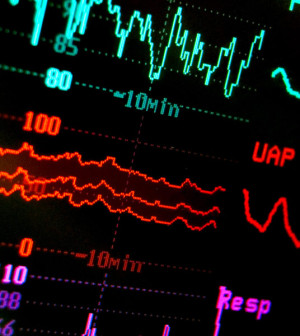- Could Your Grocery Store Meat Be Causing Recurring UTIs?
- Are You Making This Expensive Thermostat Error This Winter?
- Recognizing the Signs of Hypothyroidism
- 10 Strategies to Overcome Insomnia
- Could Artificial Sweeteners Be Aging the Brain Faster?
- Techniques for Soothing Your Nervous System
- Does the Water in Your House Smell Funny? Here’s Why
- Can a Daily Dose of Apple Cider Vinegar Actually Aid Weight Loss?
- 6 Health Beverages That Can Actually Spike Your Blood Sugar
- Treatment Options for Social Anxiety Disorder
Even Treated Depression May Raise Stroke Risk


Depression in older adults appears to significantly increase the risk of a stroke, even after depression symptoms have gotten better, a new study suggests.
The researchers found that people who had severe symptoms of depression were more than twice as likely to have a stroke as those with no symptoms. People who had symptoms at the first interview, but had gotten better by the second interview still had a 66 percent higher stroke risk, the study authors said.
“The surprising finding that stroke risk remains elevated even if symptoms seem to have gone away make replicating this study urgent,” said lead researcher Paola Gilsanz, a research fellow at Harvard University’s T.H. Chan School of Public Health in Boston.
“If replicated, these findings suggest that doctors should seek to identify and treat depressive symptoms before harmful effects on stroke risk start to accumulate,” she said.
It’s important to note, however, that this study only found an association between depression and stroke risk. It can’t prove a cause-and-effect relationship between these conditions, due to the study’s design.
Although how stroke and depression might be linked isn’t clear, other research has shown that depression increases the risk of high blood pressure, abnormalities in the nervous system and increased inflammation, the researchers said.
Moreover, depression might trigger conditions such as infection and an abnormal heart rhythm known as atrial fibrillation, which can increase the risk of stroke, the study authors said. In addition, depressed people are more likely to smoke and be less physically active, they added.
The report was published online May 13 in the Journal of the American Heart Association.
“The results of this study underscore the powerful medical risks associated with major depression,” said Simon Rego, director of psychology training at Montefiore Medical Center and Albert Einstein College of Medicine in New York City.
The most compelling finding is that the risk of stroke associated with depressive symptoms is unlikely to be completely eliminated in the short-term, even with successful treatment of depression, he said.
For the study, Gilsanz and colleagues collected data on more than 16,000 men and women. They were all 50 and older. And they were part of the Health and Retirement Study that ran from 1998 to 2010.
Over 12 years, nearly 1,200 people had a stroke. Throughout the study period, between 10 and 12 percent of participants had high levels of depressive symptoms. Another 8 to 10 percent of study volunteers reported depression that had recently remitted. The researchers didn’t ask whether depressive symptoms lessened because of treatment or for other reasons.
In addition to the overall increased risk of stroke for people with depression, the findings suggested that stroke risk remains elevated even when depression has eased, especially for women, the researchers said. They also noted that people under 65 who had depressive symptoms had a greater risk of stroke compared to those over 65 with depression.
The study also found that people with recent-onset depression — depressive symptoms that started in-between the study interviews — didn’t have a significantly increased stroke risk. The researchers said that suggests that depression may contribute to physiological changes over the long-term.
Whether or not treatment of depression can quickly lower stroke risk, it’s still crucial to get treatment for depressive symptoms, experts say.
“The good news is that there are a number of treatments such as a specialized type of talk therapy called cognitive behavioral therapy, as well as medications that are available to effectively treat depression, once it has been identified,” Rego said.
More information
For more on depression, visit the U.S. National Institute of Mental Health.
Source: HealthDay
Copyright © 2026 HealthDay. All rights reserved.










